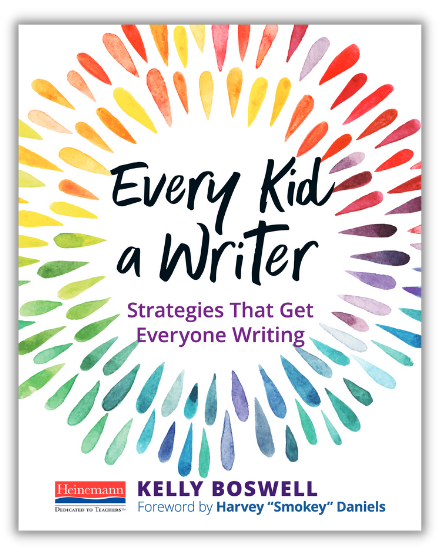
Reflect on Modeling in Your Own Life and in Your Own Writing
Let’s take a moment to reflect on your own life. When you set out to learn something new, maybe you pull a book off the shelf or pull up some instructions on a website. But I’m guessing that what is most helpful to you is watching an expert demonstrate how to do it. I’m guessing that a demonstration is more powerful than the description and it helps the new skill seem much more doable. Am I right?
Think of it this way: A mentor text is like the picture on the top of the box of a jigsaw puzzle. It shows what the puzzle should look like when it’s complete. But modeling, or teacher demonstration, goes a step beyond. When an expert puzzle completer (in keeping with this analogy) shows you how he looks carefully at each piece, how he finds the border pieces, and how he looks for pieces that have a similar color scheme, you are able to see how an expert puts the puzzle together to create the finished product that is depicted on the box.
As writing teachers, part of our job is to inspire all students to see what’s possible in their own writing by introducing them to the powerful, high quality writing of others that can be found in mentor texts. But we also need to take that next step and demonstrate how a writer gets an idea from his or her head to the page.
Being the Writer Your Students Need You to Be
The more we write, the more insight we gain into what students experience and the more we understand the subject matter of writing. Think about it: We don’t sign our kids up to take piano lessons from someone who doesn’t play the piano himself. People who play the piano tend to make better piano teachers because they actually engage in the skill they are teaching.
To be genuinely helpful writing models for our kids, we need to be writers. We need to climb into the trenches ourselves. Don’t worry. I’m not suggesting that you write America’s next great novel or that you spend your next free weekend crafting a research paper. There are dozens of ways to engage in writing. Here are a few ideas you might consider:
- Keep a gratitude journal. Each day, jot down a few things for which you are grateful.
- Write notes of appreciation to your principal, fellow teachers, and support staff.
- Digitally, or by hand, create a photo book for someone or yourself. Write a caption for each photo that captures the memory.
- Write a blog post about teaching, cooking, cycling, or any other area of passion. Publish it or simply hold on to it.
- Take sketchnotes (visual notes) at your next professional development session or staff meeting.
- Participate in a Twitter chat.
- Write an online review of a new restaurant, a book you’ve read, or a product you’ve recently purchased.
- Write love notes to your significant other and leave them in random places where he or she will find them.
- Leave supportive or reflective comments on someone else’s blog.
- If you have children of your own, keep a written record of funny things they do or say.
- Carve out ten minutes a month to write a letter.
- When a family member celebrates a birthday, create a list of things you admire and appreciate about them—one item for each year of their age.
- At the end of the school day, take a moment or two to write down your reflections and thoughts. What excited you today? What did you learn? What was frustrating or challenging?
- As you confer with your students during reading, writing, or math time, jot down a few sentences to help you remember what you talked about and what you celebrated in the students’ work.
- If you and your colleagues meet in a PLC (professional learning community) or team meeting, carve out five minutes each time you meet and use that time to write down your thoughts or hopes.
Whether it’s a journal, a blog, some poetry, or an article, engage in the writing process for yourself. Do it often. Then ask yourself some questions: What supported you as a writer? What was challenging? Did you learn anything about yourself as a writer? Did anyone else read your writing? How did knowing that your writing would (or wouldn’t) have an audience affect you as a writer?
If you do this kind of work outside the writing classroom, you’ll be better equipped to support, guide, teach, and energize the students in front of you.

To learn more about Every Kid a Writer visit Heinemann.com.
👉 To browse more blogs featuring Kelly Boswell click here.

Kelly Boswell has many years of experience as a classroom teacher, staff developer, literacy coach, and district literacy specialist.
Her latest book, Every Kid A Writer, was published in October 2020. She is the coauthor of Crafting Nonfiction and Reading Solutions and the author of Write This Way and Write This Way From the Start. She is also the author of several nonfiction children’s books.
Kelly works with schools and districts around the country to support educational leaders, coaches and teachers. Her emphasis is on developing literacy practices that help students become joyful and passionate readers and writers.


